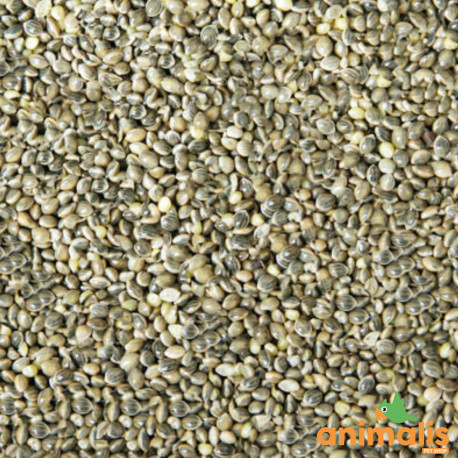



Reference: 167803
They have the property of binding to minerals such as calcium, iron and zinc and making them less bioavailable.
They have the property of binding to minerals such as calcium, iron and zinc and making them less bioavailable.
Flaxseed is rich in omega 3, which is essential for the cardiovascular system.
Onion seeds are rich in minerals, vitamins, and antioxidants.
Carrot seeds are very rich in vitamins with a high proportion of vitamin A and carotene, as well as vitamin B, calcium and valuable carbohydrates.
The turnipseed is quite similar to rapeseed, with the difference being the more bitter flavour of the latter. Turnipseed is rich in protein and beneficial for enhancing singing, making it particularly interesting during the breeding season for canaries. However, as this seed is quite fatty, we recommend not exceeding 10% of your mix with turnipseed for colour canaries or posture canaries. For song canaries, turnipseed softens the song and can therefore be used at 30% of the mix: in this latter case, we recommend accompanying your bird's diet with liver support.
Spinach seeds contain vitamins A, B1, B2, B3, B7, B9 and C, mineral salts and trace elements. Regular consumption helps to strengthen the feathers.
Chenopodium quinoa is an annual plant, one to two meters tall or more. The central stem is cylindrical at the collar and becomes more angular higher. It can be unique or have many ramifications, with a diameter ranging from one to eight centimeters and a height of 0.5 to 3 m, depending on the varieties and growing conditions such as seeding density or fertilization9. Its color is also very variable: uniformly green, green with purple or red streaks, or uniformly red.
The thistle-Marie seed has hepatoprotective properties. It is therefore excellent for our birds to avoid liver problems as a preventive measure.
Striated sunflower is the basic seed of any parrot mixture. It is also used in mixtures for parakeets and exotic doves.
It is also the favorite food of your outdoor birds during the winter period! Ideal for feeding the birds in your garden.
Practical information for giving sunflower seeds to birds in your garden:
Remember to regularly clean the feeders of your outdoor birds so that diseases and bacteria do not thrive.
Also consider setting feeders high up to prevent predators (such as cats, foxes, etc.) from targeting birds when they are eating.
Basil 1kg
Basil contains many antioxidants, is anti-inflammatory, and helps against stress. This does not mean that basil is considered a medicine. Dried basil is of course also different from fresh basil plants. But the fact remains: basil is good for health.
Clover stimulates the immune system and slows down cellular ageing through its excellent antioxidant properties. Rich in vitamins B, C, E and provitamin A.
Yellow millet is rich in vitamins and minerals and is an alkaline (non-acidic) cereal. It is part of the basic diet of parakeets, exotic birds and exotic doves.
Millet contains magnesium, phosphorus, iron, potassium, manganese, vitamin A, vitamin B1, vitamin B2, vitamin PP (nicotinic acid) and vitamin B5.
Chicory seeds (cichorium intybus) are among the health seeds that come from wild plants. These seeds are rich in fiber and minerals and help maintain intestinal balance.
They purify the body and are also effective in cases of indigestion.
Seeds for canaries and exotic and native birds.
Premium high-quality, high-fat seeds
- With a high content of vitamin E, B9, B5, B6, B1, B2, B3 and vitamin K.
- It has antioxidant properties.
- Excellent energy contribution.
- Rich in calcium, potassium, magnesium, phosphorus, protein, zinc, thiamine, pectin (cleanses the body).

They have the property of binding to minerals such as calcium, iron and zinc and making them less bioavailable.
